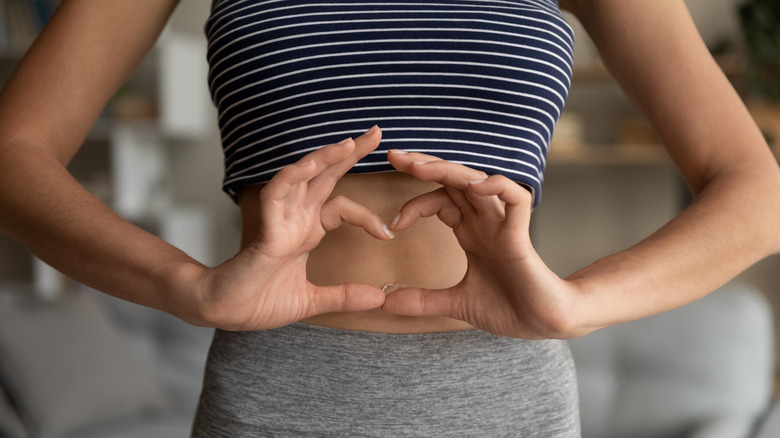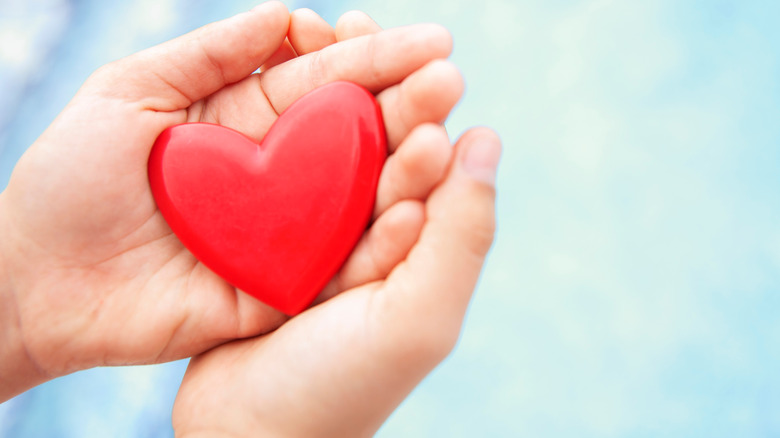Does The Menstrual Cycle Have Health Benefits?
Between cramps, fatigue, and bloating, it may be difficult to focus on the benefits of getting your period. However, menstruation may play a key role in your overall health and longevity, says Cosmopolitan. When you're on your period, your hormones can make sex more enjoyable and help you achieve better orgasms. And at the very least, it's a good excuse to curl up and indulge yourself with some downtime while you catch up on your favorite show.
Beginning at an average age of 12, women experience a regular shedding of their uterine lining that is called their period, according to Cleveland Clinic. Women continue to experience a period every 21 to 35 days, with the average menstrual cycle being 28 days, until they go through menopause at the average age of 51. A normal period lasts for between two and seven days, and during this time a combination of blood and uterine tissue is shed to make way for a new egg to drop during the following monthly cycle.
While common side effects include acne, breast tenderness, moodiness and irritability, and cramps in both the abdomen and lower back, there may be some benefits of the menstrual cycle that extend beyond fertility. Here's what you should know about some of the benefits of the menstrual cycle.
Your period may help you live longer
Having your period can be a nuisance for a few days each month, but ultimately you may add several years to your life, according to Time. One reason that women live longer on average is that they tend to experience the onset of cardiovascular disease later than men do, which some experts attribute to menstruation. During menstruation, iron is expelled from the body. While iron is necessary for our health, it also contributes to cell reactions that produce free radicals that can damage DNA and cell membranes, thus leading to the aging of cells. Since women lose iron on a monthly basis through menstruation, there is less iron in the body to adhere to cells and lead to aging. Research suggests that regularly donating blood may also extend lifespan for similar reasons, per Columbia University.
A hypothesis called the "jogging female heart" reinforces the connection between menstruation and delayed onset of cardiovascular disease (via BBC). The theory asserts that since women's cardiac outputs increase during the second half of their menstrual cycles, their hearts are constantly being challenged and strengthened in ways that men's hearts aren't. For reference, the increased heart output women experience during menstruation is the equivalent of working out their heart during moderate exercise, according to a 2007 review in European Journal of Obstetrics & Gynecology and Reproductive Biology. The result is believed to be greater overall heart health that contributes to longevity for women.
Changing attitudes about menstruation
Not only can your menstrual cycle make your heart stronger and healthier, add years to your life by delaying cardiovascular disease, and reduce the amount of iron adhering to your cells and causing them to age, but there are other reasons to love your period. Cosmopolitan reports that one benefit of going through your monthly cycle is that it helps you bond with other women. The experience of cramps, acne, and bloating is something other women can relate to, so you're not alone. There's an affinity in knowing that periods are experienced by women across the globe.
Historically, menstruation has been shamed and women have been made to feel embarrassed about perfectly normal body functions, says a 2020 review published in The Palgrave Handbook of Critical Menstruation Studies. Maureen C. McHugh discusses how "menstrual moaning" refers to the exclusively negative manner in which women have been culturally trained to speak about their periods. When describing their menstrual cycles, women focus solely on negative aspects such as pain and discomfort.
McHugh asserts that cultural attitudes have trained women to treat their periods as taboo, but by breaking the stigma and rejecting "menstrual moaning", the cultural dialogue about menstruation can be changed. Some research even suggests that discussing positive aspects of menstruation with other women can help make periods a better experience. When your period can help you live longer and make you healthier, why speak about it through an exclusively negative lens?



